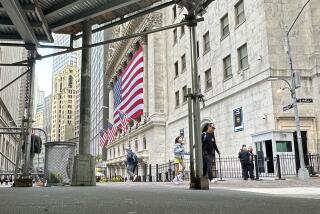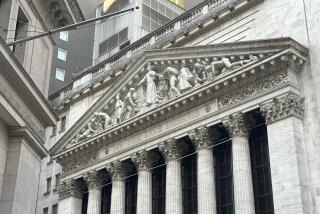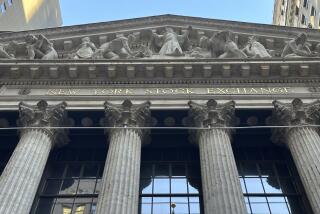Surge in tech stocks leads market higher in first half of year

Stock investors already have enjoyed welcome fireworks this year with an especially big pop in major technology shares.
As Wall Street closed the books on the first half of the year — ahead of what for many will be a four-day July 4 break — the market was sitting on substantial gains, with tech stocks leading the way.
Facebook Inc. has jumped 31% this year, while Apple Inc. and Netflix Inc. are up more than 20%. E-commerce giant Amazon.com Inc., which often is viewed as a tech stock, shot up 29%, and Google parent Alphabet Inc. rose 17%.
“It’s been an incredible performance by some of the most highly valued stocks in the tech sector,” said Patrick O’Hare, chief market analyst at the investing website Briefing.com.
The stocks’ surge helped propel the tech-heavy Nasdaq composite index to a 14.1% gain so far this year, nearly double its 7.5% rise in all of 2016.
The index’s gain this year easily outpaced the blue-chip Dow Jones industrial average and the broader Standard & Poor’s 500, which are up 8% and 8.2%, respectively, for the six months.
All three measures set new highs last month, with the Nasdaq hitting a record 6,321.76 on June 8.
The Nasdaq index slipped 3.93 points Friday to 6,140.42, while the Dow Jones industrials gained 62.60 to 21,349.63 and the S&P 500 edged up 3.71 to 2,423.41.
To be sure, there’s considerable uncertainty in some sectors, such as healthcare, where Wall Street is trying to anticipate what changes the Trump administration will achieve in overhauling the Affordable Care Act.
But some analysts don’t see political or economic developments on the horizon that would trigger a sharp, sustained pullback in the overall market for at least the next few weeks. Stocks also have benefited lately from the absence of unexpected financial shocks overseas.
“Synchronized global growth, few indications of a looming recession, restrained inflation and rising earnings are among reasons to maintain a favorable outlook,” Terry Sandven, chief equity strategist at U.S. Bancorp Wealth Management, wrote in a note to clients this week.
He dubbed it a “not too hot/not too cold Goldilocks-like economic environment” that enabled the stock market’s first-half performance to be “superb and broad-based.”
That doesn’t mean the bears aren’t lurking. While many agree with Sandven that earnings growth, low inflation and other factors still bode well for stocks, other factors could cause a drag on future gains.
For instance, the market rallied after President Trump’s election because he promised to pursue lower corporate taxes and heavy spending on infrastructure projects, among other pledges.
But “it seems that he’s no closer to fulfilling his campaign promises than the day he took the helm of the world’s biggest economy,” Beth Ann Bovino, chief U.S. economist at S&P Global Ratings, said in a report Thursday.
“Now we no longer believe the federal government will be able to push through even a small infrastructure package, and we expect only moderate tax cuts to be passed early next year as midterm elections approach,” she said.
For that reason, O’Hare said he believes investors already have priced into stocks any premium related to the possibility of lower taxes, “so if you actually do get corporate tax reform, I don’t see that it’s going to be a moonshot for the market.”
There’s also the threat that investors will soon decide that the market has become too rich — that prices are too high relative to the companies’ underlying profitability and earnings potential.
In the last week of June, the S&P 500 was trading at about 21.5 times the companies’ combined earnings for the trailing 12 months, well above the historical average of 14.5 to 15, Sandven said.
But at the same time, those “earnings are increasing” and that is “serving as the basis for advancing stock prices,” he said.
O’Hare said the big tech companies have “put up some impressive growth in terms of earnings and revenue, Facebook in particular,” and that’s especially appealing to investors at a time when the overall U.S. economy is showing only modest expansion.
Facebook’s first-quarter earnings soared 76% from a year earlier, and the social-media giant’s revenue jumped 49%.
The Commerce Department said Thursday that the nation’s gross domestic product, the broadest measure of U.S. economic health, grew at an annual rate of 1.4% in this year’s first quarter.
Many economists see the nation’s GDP ending this year with 2% growth or higher, along with slightly higher inflation and interest rates.
The Federal Reserve Board last month nudged its key short-term rate to a range of 1% to 1.25%, and many economists expect more small increases that will lift the rate to 1.5% to 1.75% by year’s end.
Yet the yield on the 10-year Treasury note, at 2.30% Friday, has dropped from 2.48% at the start of this year.
For now, “sound fundamentals should continue to support [stock] markets,” Brad McMillan, chief investment officer for Commonwealth Financial Network, said in a research note Friday.
“After the turmoil in recent months and years, this is not a bad place to be,” he said.
Twitter: @PeltzLATimes
More to Read
Inside the business of entertainment
The Wide Shot brings you news, analysis and insights on everything from streaming wars to production — and what it all means for the future.
You may occasionally receive promotional content from the Los Angeles Times.










